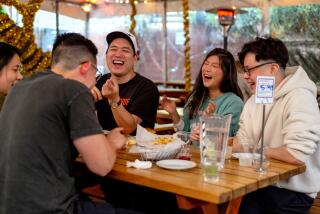Age Is No Bar to Good Service : Popular Civic Center Pair Can Mix a Mean Drink
SAN DIEGO â Youâve seen them in their starched white shirts, black vests and bow ties. And theyâve seen you.
Theyâve seen you in pearls and furs at the opera or in heavy chain belts and scarlet spike hairdos at the latest Adam Ant concert. Theyâve seen you trying to sell porcelain dolls or demonstrating a new office gadget; anxiously awaiting election returns or swearing at a boxing match.
It is this parade of people that keeps Whitey and Casey Kepner behind the bar at the Civic Center, serving up drinks to the highbrow, lowbrow and in between. They are the oldest--and fastest--bartenders there.
Whitey, 74, has worked at the job for 10 years and Casey, 65, has been at it for six years. They tried to retire years ago but âgolf gets old,â Whitey said.
Some observations they have made of peoplesâ drinking habits:
- Opera audiences are not a drinking crowd. With three intermissions, the bar take is only about $1,000, compared to $8,000 during the one intermission at a rock concert. Opera patrons prefer champagne and white wine; rockers like beer and vodka.
- Symphony audiences crush the bar during the 15-minute intermission, while Country-and-Western audiences wait calmly in line.
- Women are the ones most inclined to hold up the lines, not having money ready for their drinks.
- Ballet audiences are a better drinking crowd than the opera and symphony.
- Vodka is the most popular hard liquor, among all audiences. Twice as much vodka is sold than any other hard drink, usually with tonic or in a screwdriver.
- Hard liquor in general is out of style, replaced in popularity by white wine.
What people drink is about the only observation the couple has time to make when hundreds swarm to them for refreshment.
âYou havenât seen anything till you see 2,000 or 3,000 punk rockers all orange, green and pink run up to the bars at intermission,â said Casey. âThey might be screaming their heads off when the musicâs playing but theyâre real polite when they get to us. I love to watch them.â
âYou have to love people to do this job anyway,â Whitey added.
The two are old-school bartenders. They know how to ice up the glasses before the intermission rush. They can count change while pouring drinks without a hint of nervousness or irritation. They know how to shut off a drunk without making trouble, and they can explain to people that drinks are not free without causing offense.
âAnd I can take in more money than the young kids any day,â said Whitey.
Their own calm dignity pacifies customers anxious to get their drinks before the house lights dim. They make you want to behave as well as they do.
Whiteyâs name is self-evident. White beard, long white mane, bushy white eyebrows that nearly obscure deep set blue eyes. He looks like a garrulous old seafarer, bent in concentrated work over the bar. Heâs not at all garrulous, but he was a seafarer. He put in 20 yearsâ duty in the Navy as a bosunâs mate, retiring after the Korean War.
From the forecastle of the destroyer Zane, Whitey saw the first bomb blasts of the airplane hangars at Pearl Harbor. He remembers a kid sailor next to him yelling: ââWhat the hell are they blowing those up for? They just built them!â
âIt was over so fast,â he says, shaking his head in disgust. âWe could have wiped them out if weâd been ready, they came flying in just like pigeons.â
He smiles at Casey with boyish pride: âSee that, Case,â he points to a page in his embossed green leather booklet that records his Navy service, âparticipated in the defense of Pearl Harbor with commendable action . . . â
While Whitey spent the war aboard ship, Casey toured the country as a singer raising money for war bonds with the likes of Abbott and Costello and Jack Dempsey. She sang for 12 years as Ethel Shepherd, working a circuit of East Coast nightclubs and cabarets. When she started singing in clubs she was still too young to drink in them. Black and white publicity photos and yellowed press clippings show a slim young woman with a starry-eyed look posed in a variety of evening gowns. She keeps her blond hair in a similar pageboy that calls to mind Rosemary Clooney and other popular singers of the war years.
âYes, my real name is Ethel and his is Albert,â Casey says, laughing. âCan you blame us for using our nicknames?â
The Navy brought them both to San Diego. It was Whiteyâs last station. Casey followed her former Marine husband here. But singing jobs were few in San Diego in 1949, so she turned to work as a cocktail waitress. After all, she says, her mother had raised her while selling cigars, cigarettes and potato chips in Detroit clubs. She had never been a stranger to night life.
They met while working with each other much as they work together now, 25 years later. For three years, he mixed drinks and she served them at the former Guys and Dolls bar on El Cajon Boulevard. Then they got married. It was the heyday of Whiteyâs bartending career, which began after his Navy days, when he left San Diego State University six months short of earning a degree in mathematics to âhelp out a friend whose bar was in financial trouble.â He went on to tend and manage 30 different San Diego bars, his longest stint 12 years at the Frontier on Midway Drive before he tried to retire in 1972.
âUsed to be weâd have to go out to the bars every night, afraid weâd miss something, but we stopped that about 20 years ago. I think you just grow out of drinking; I used to like my VO, but donât have a taste for it anymore,â Whitey says.
He has a glass of wine or beer now and again; Casey enjoys her vodka at home. He says heâs also grown out of smoking so much. Heâs down to three packs a day from the five he used to smoke. Heâs convinced heâll get sick if he gives his body a jolt like quitting.
Three or four times a week they tend bar for concerts, trade shows, private parties, dances and special events at the Civic Center--enough to get out in the world. They are the first ones their boss calls for a job.
âThereâs a lot of things that add up to making them special,â says Woody Takansilpvat, who manages Civic Center concessions for the Service America Corp. âTheyâre especially courteous yet fast at the same time. Whitey works a lot faster than the younger ones.â
The part-time work pays $7.35 an hour (definitely retirement work, Whitey says) and is a straight shot down U.S. 94 from their hillside bungalow near Lemon Grove.
The work keeps them young, they say. It leaves plenty of time for Casey to play her weekly golf game and for Whitey to play with his two golden retrievers and keep up the backyard garden and pool. Best of all, they donât get stuck listening to some boreâs life story, an occupational hazard for bartenders.
Their favorite Civic Center job is the regular Latino dances, when 2,000 or 3,000 show up to dance their hearts out.
âTheyâre so polite and well mannered but they really know how to have fun,â Casey says.
She especially likes the opera--to watch the parade of fashion--and the beauty operatorsâ trade shows for the hair styles. They both enjoy working the Harvest Festival, for the variety of people who come.
âOne job Iâd be happy never to work again is that Vietnamese new year,â says Whitey. âThose people donât drink a thing. They come up and point at something and you canât understand them, and it turns out all they want is a cup with ice in it.â
Orientals arenât a drinking people,â observes Casey. ââPeople who dance are drinking people.â
Drinking is different now, they say. A bottle of wine used to collect dust in the back of Whiteyâs bar. Now you canât keep enough in stock. Or the way they make an old fashioned now: used to be Whitey would take a cube of sugar and âmuddleâ drops of bitters into it before adding the bourbon.
âNow they just toss it all together, sugar syrup and rest and it just doesnât taste the same. People want drinks fast now,â Whitey says.
Casey doesnât like the tight T-shirts and sloppy clothes a lot of bartenders wear; they all used to wear formal black and white even at the worst bars in town, she says.
Recalling their work recalls their life together. They are solicitous of each other. They regard themselves as plain decent people, and after more than 30 years of serving thousands of drinks to thousands of people, they believe that 99 per cent of people are good and decent too.
âYou always get that one whoâs always telling you how important he is and all the wonderful things heâs accomplished, the one you canât do anything right for, but most arenât like that,â Whitey says.
âDrinking is a great equalizer,â Casey adds. âIn a bar, you can have a judge next to a mechanic and theyâre no different from each other. In fact, some of the most intelligent-seeming people act the most stupid when they get a few drinks in.â
More to Read
The biggest entertainment stories
Get our big stories about Hollywood, film, television, music, arts, culture and more right in your inbox as soon as they publish.
You may occasionally receive promotional content from the Los Angeles Times.










